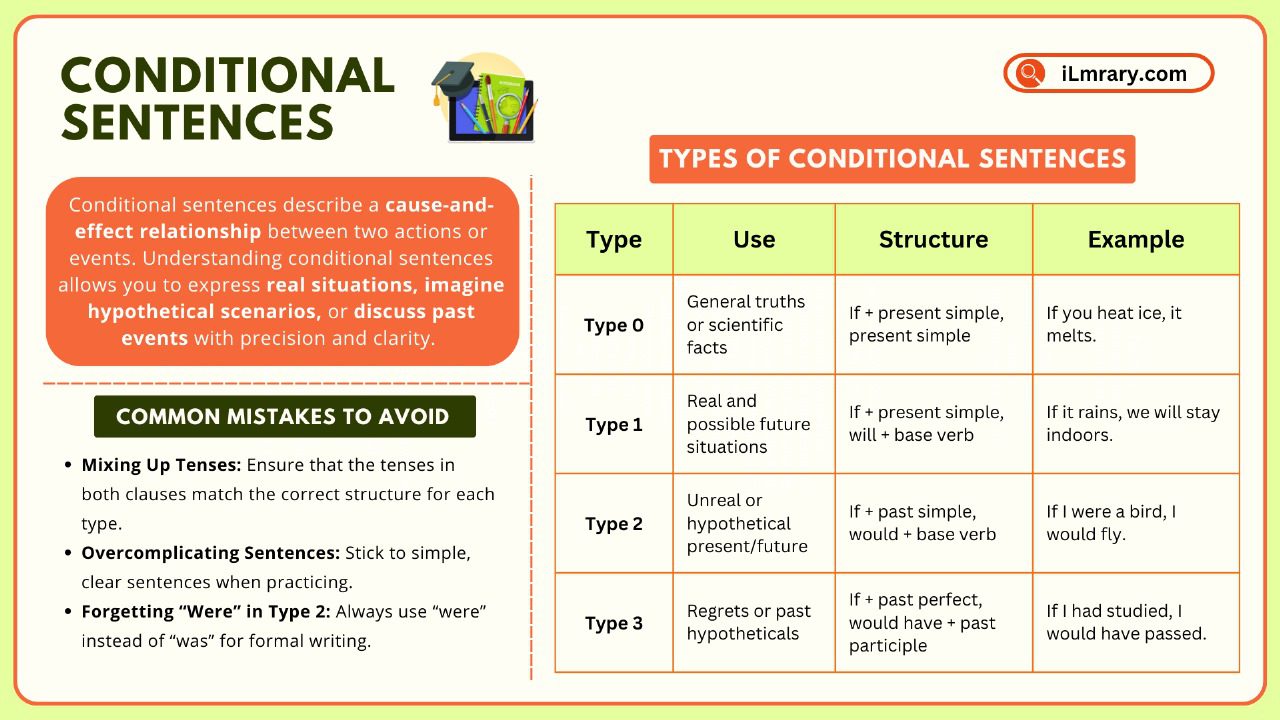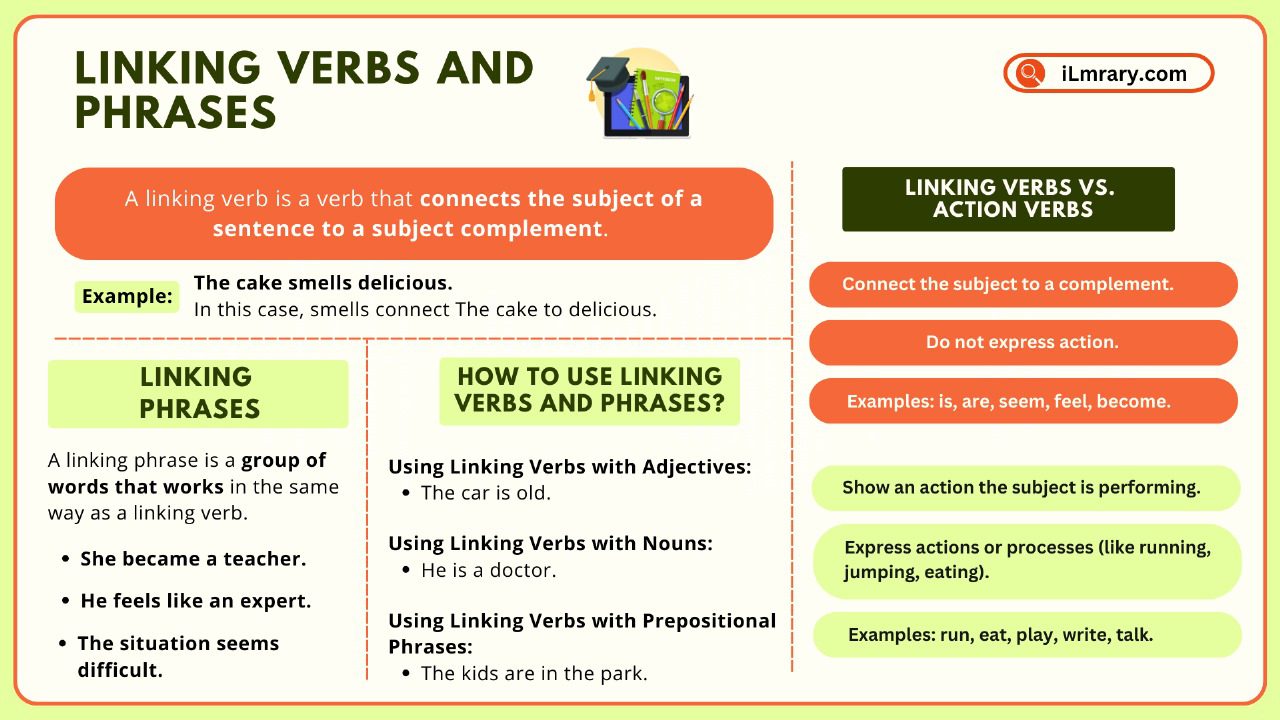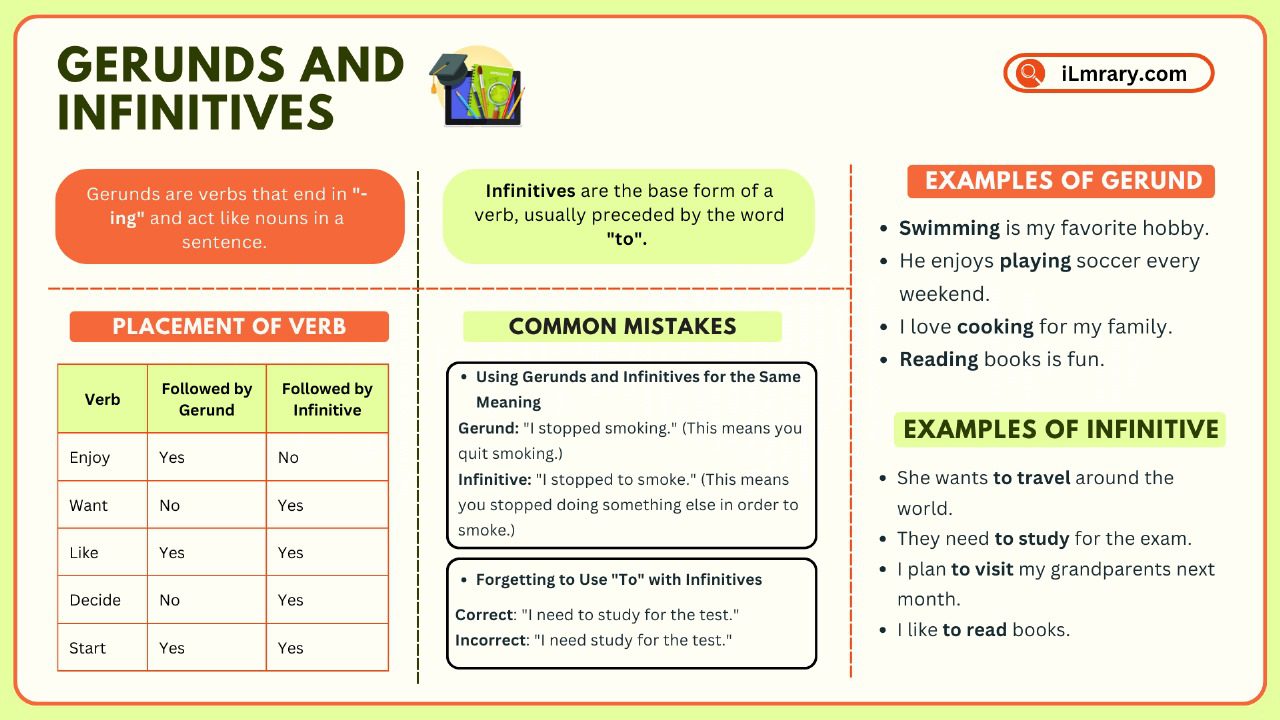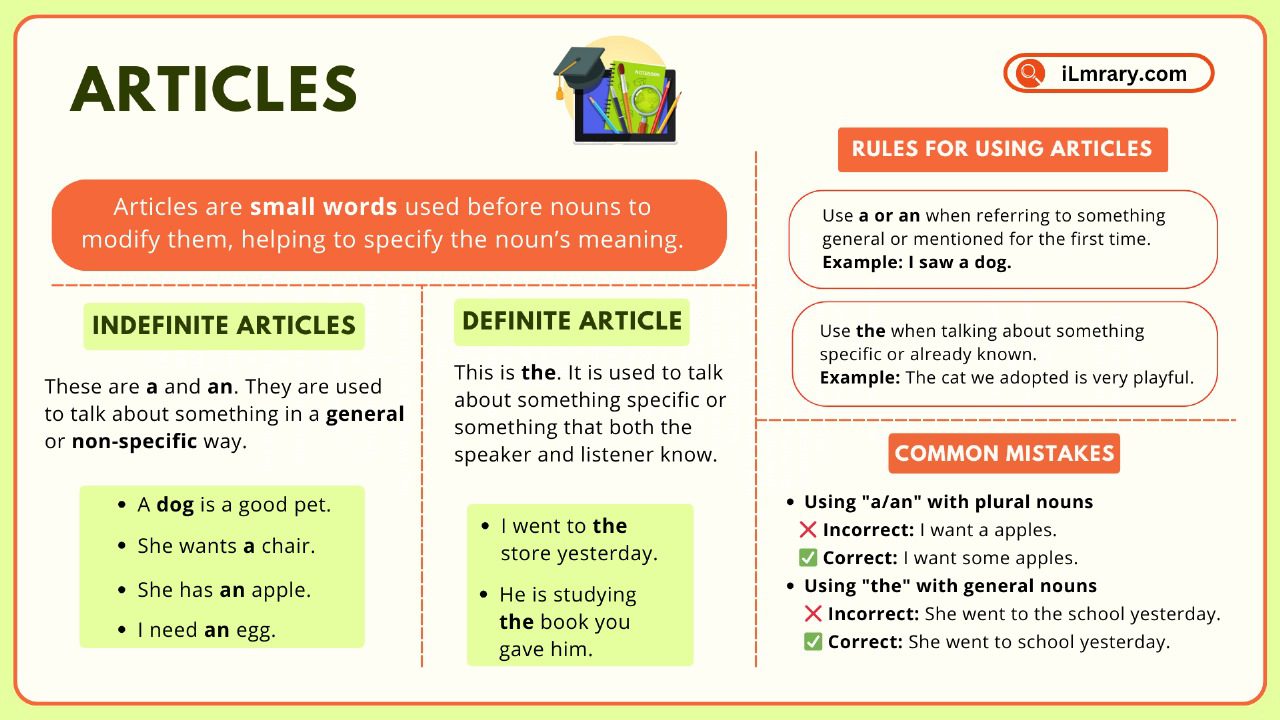Conditional sentences might seem a little tricky at first, but they are essential for mastering English grammar. These sentences help in expressing possibilities, hypothetical situations, and even regrets. By understanding how these sentences work, you can easily improve your ability to communicate ideas in English.
Let’s discuss the four main types of conditional sentences. These 4 types include: Type 0, Type 1, Type 2, and Type 3 conditional sentences. With detailed explanations and practical examples, you’ll soon understand how to use each type confidently in your writing and conversations.
Contents
What Are Conditional Sentences?
Conditional sentences describe a cause-and-effect relationship between two actions or events. Understanding conditional sentences allows you to express real situations, imagine hypothetical scenarios, or discuss past events with precision and clarity. They are composed of two main parts:
- The condition clause (if-clause), which introduces the condition that must be met.
- The result clause, which explains the outcome if the condition is satisfied.
These sentences often begin with the word “if,” but they can also use other conditional words such as “when,” “unless,” or “provided that.”
For Example:
If it rains, the ground gets wet.
- If it rains is the condition.
- The ground gets wet is the result.
Types of Conditional Sentences:
- Type 0 (General Truths)
- Type 1 (Real and Possible Situations)
- Type 2 (Unreal or Hypothetical Situations)
- Type 3 (Past Hypotheticals or Regrets)
Type 0 Conditional Sentences: (General Truths)
Type 0 conditional sentences express universal truths, scientific facts, or situations that are always true. They are used to state facts or laws of nature. Their structure is like this: If + present simple, present simple.
Furthermore, keep in mind that Type 0 conditionals are timeless so they apply universally regardless of time or situation. Moreover, both clauses use the present simple tense because they describe actions or phenomena that are always true.
For Example:
- If you heat water to 100°C, it boils.
- If you don’t water plants, they die.
- If the sun sets, it gets dark.
- If metal is exposed to air, it rusts.
Type 1 Conditional Sentences: (Real and Possible Situations)
Type 1 conditional sentences describe situations that are likely or possible to happen in the future, provided the condition in the if-clause is met. Their structure is like this: If + present simple, will + base verb.
Additionally, Use Type 1 for realistic, probable future scenarios. These events are not guaranteed but are highly likely. So, in the result clause, you can also use modal verbs like “can,” “may,” or “might” instead of “will” to explain possibility.
For Example:
- If you study hard, you will pass the exam.
- If it rains tomorrow, we’ll stay indoors.
- If she calls, I’ll let you know.
- If you don’t exercise, you will gain weight.
Type 2 Conditional Sentences: (Unreal or Hypothetical Present/Future Situations)
Type 2 conditional sentences are used to describe imaginary, unlikely, or hypothetical situations in the present or future. These scenarios are contrary to reality. Their structure is like this: If + past simple, would + base verb.
Furthermore, use “were” for all subjects, including “I,” instead of “was” (“If I were” is considered more formal and correct). Type 2 is ideal for expressing dreams, wishes, advice, or unlikely events.
For Example:
- If I were rich, I would travel the world.
- If he studied more, he would get better grades.
- If you knew her, you would understand her better.
- If I had a car, I would drive to work every day.
Type 3 Conditional Sentences: (Regrets and Past Hypotheticals)
Type 3 conditional sentences discuss situations that did not happen in the past and their imagined outcomes. So we can say that they often express regret or missed opportunities. Their structure is like this: If + past perfect, would have + past participle.
The if-clause uses the past perfect tense to refer to a condition in the past. The result clause often includes modal verbs like “could have” or “might have” for additional nuance.
For Example:
- If I had woken up earlier, I wouldn’t have missed the bus.
- If they had practiced more, they would have won the game.
- If she had known about the meeting, she would have attended.
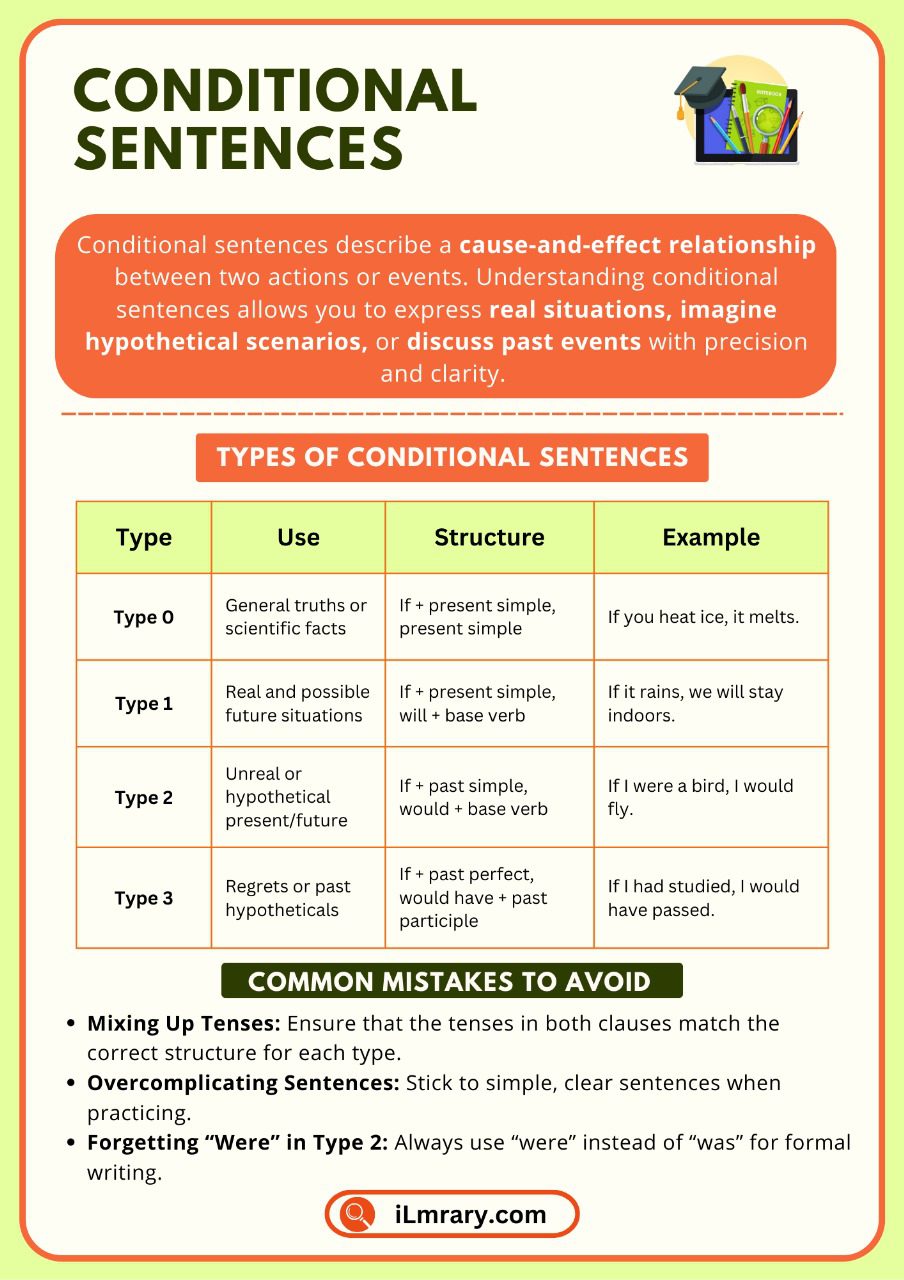
Conditional Sentences
Comparison Table: Conditional Sentence Types
Conditional sentences can seem overwhelming, but organizing them in a structured way makes learning easier. Here’s a comprehensive table summarizing their differences at a glance:
| Type | Use | Structure | Example |
| Type 0 | General truths or scientific facts | If + present simple, present simple | If you heat ice, it melts. |
| Type 1 | Real and possible future situations | If + present simple, will + base verb | If it rains, we will stay indoors. |
| Type 2 | Unreal or hypothetical present/future | If + past simple, would + base verb | If I were a bird, I would fly. |
| Type 3 | Regrets or past hypotheticals | If + past perfect, would have + past participle | If I had studied, I would have passed. |
Common Mistakes to Avoid
When learning conditional sentences, it’s easy to make mistakes, especially when dealing with different tenses and structures. Here are some of the most common errors, along with explanations and corrected examples:
1. Mixing Up Tenses
One of the most frequent mistakes is using the wrong tense in the if-clause or the result clause. Each type of conditional sentence has a specific tense structure, and mixing them up can lead to confusion.
| Type | Incorrect Sentence | Correct Sentence | Structure |
|---|---|---|---|
| Type 1 | If I will go to the party, I will meet her. | If I go to the party, I will meet her. | If + present simple, will + base verb |
| Type 2 | If I had a million dollars, I will buy a house. | If I had a million dollars, I would buy a house. | If + past simple, would + base verb |
| Type 3 | If she had studied, she will have passed the exam. | If she had studied, she would have passed the exam. | If + past perfect, would have + past participle |
2. Using “Would” in the If-Clause
A common error is using “would” in the if-clause, which is grammatically incorrect. “Would” should only appear in the result clause for Type 2 and Type 3 conditionals.
| Incorrect Sentence | Correct Sentence | Type | Structure |
|---|---|---|---|
| If I would win the lottery, I would travel the world. | If I won the lottery, I would travel the world. | Type 2: Hypothetical present/future | If + past simple, would + base verb |
| If he would have called, I would have answered. | If he had called, I would have answered. | Type 3: Hypothetical past | If + past perfect, would have + past participle |
3. Confusing “Was” and “Were” in Type 2 Conditionals
In Type 2 conditionals, “were” is used for all subjects (including “I,” “he,” “she,” and “it”) in formal English. While “was” is sometimes used in informal speech, it’s better to stick to “were” for correctness.
| Incorrect Sentence | Correct Sentence | Type | Structure |
|---|---|---|---|
| If I was rich, I would buy a yacht. | If I were rich, I would buy a yacht. | Type 2: Hypothetical present/future | If + past simple (were), would + base verb |
| If she was here, she would help us. | If she were here, she would help us. | Type 2: Hypothetical present/future | If + past simple (were), would + base verb |
4. Forgetting the Past Perfect in Type 3 Conditionals
Type 3 conditionals require the past perfect tense in the if-clause. Using the simple past tense instead is a common mistake.
| Incorrect Sentence | Correct Sentence | Type | Structure |
|---|---|---|---|
| If I knew about the meeting, I would have attended. | If I had known about the meeting, I would have attended. | Type 3: Hypothetical past | If + past perfect, would have + past participle |
| If she studied harder, she would have passed. | If she had studied harder, she would have passed. | Type 3: Hypothetical past | If + past perfect, would have + past participle |
5. Using “Will” in the If-Clause
“Will” should never be used in the if-clause, as it contradicts the conditional structure. The if-clause should always describe the condition, not the result.
| Incorrect Sentence | Correct Sentence | Type | Structure |
| If I will see him, I will tell him. | If I see him, I will tell him. | Type 1: Real present/future situations |
If + present simple, will + base verb
|
| If it will rain, we will cancel the picnic. | If it rains, we will cancel the picnic. | Type 1: Real present/future situations | If + present simple, will + base verb |
How to Practice Conditional Sentences?
Practicing conditional sentences is essential to gain fluency and confidence. By incorporating them into your daily routine, you can make learning more effective and enjoyable. Here are some strategies and tips to help you master conditional sentences:
1. Use Real-Life Scenarios
Create examples based on your daily life. This makes the sentences relatable and easier to remember. For instance:
- If I drink coffee at night, I can’t sleep.
- If it rains tomorrow, I’ll stay home.
Why it works: Relating grammar to your own experiences helps you understand the context and usage better.
2. Write Dialogue
Imagine conversations using different types of conditionals. This helps you practice forming sentences naturally. For example:
A: What would you do if you won the lottery?
B: If I won the lottery, I’d buy a house.
Why it works: Writing dialogues helps you think on the spot and improves your ability to use conditionals in conversations.
3. Quiz Yourself
Create flashcards with partial sentences and try to complete them. For example:
- If I ______ (study) hard, I ______ (pass) the exam.
- If she ______ (call) me, I ______ (answer).
Why it works: Quizzing yourself reinforces your understanding and helps you recall the correct structure quickly.
4. Listen and Read
Watch English movies, TV shows, or read books to spot conditional sentences in context. Pay attention to how native speakers use them. For example:
- If I were you, I’d take the job. (from a movie dialogue)
- If you heat water to 100°C, it boils. (from a science book)
Why it works: Exposure to real-life examples helps you see how conditionals are used naturally.
5. Practice with Friends
Engage in conversations with friends or language partners. Use conditionals to discuss hypothetical situations or future plans. For example:
- What would you do if you had a million dollars?
- If we finish early, should we go out for dinner?
Why it works: Practicing with others builds confidence and improves your speaking skills.
6. Break Down the Structure
Understand the structure of each type of conditional sentence. For example:
- Zero Conditional: If + present simple, present simple (If you heat ice, it melts.)
- First Conditional: If + present simple, will + base verb (If it rains, I’ll stay home.)
- Second Conditional: If + past simple, would + base verb (If I were rich, I’d travel the world.)
- Third Conditional: If + past perfect, would have + past participle (If I had studied, I would have passed.)
Why it works: Breaking down the structure helps you form sentences correctly.
7. Correct Mistakes
Review your sentences and correct any mistakes. For example:
❌ If I will go to the market, I’ll buy vegetables.
✅ If I go to the market, I’ll buy vegetables.
Why it works: Identifying and fixing mistakes improves your accuracy over time.
Important FAQs:
Some most frequently asked questions about Conditional Sentences and their types are as follows:
Q: Can I use “if” with other tenses?
Yes! While these are the four main types, advanced conditionals can use mixed tenses for more nuanced meanings. For example, “If I had known, I would be there now.”
Q: Is it okay to use “was” instead of “were” in Type 2?
Was is often used in informal speech especially in American English. but Were is grammatically correct and more formal. It’s always better to use Were in writing or formal speech.
Q: Are there other ways to express conditions besides “if”?
Yes! Words like “unless,” “in case,” and “as long as” can also express conditions. For example, “Unless you study, you won’t pass.”
Conclusion:
Mastering conditional sentences is a step towards speaking and writing English fluently. Each type serves a unique purpose, allowing you to communicate with greater nuance and accuracy. Start with understanding the basics of each type, practice regularly, and soon these sentences will become second nature to you. Remember, consistency is key, and don’t be afraid to make mistakes while learning!
You May also like:


